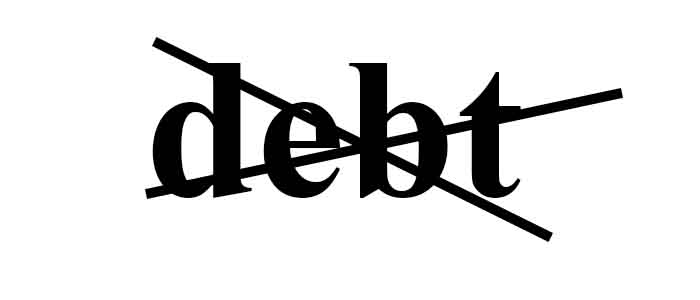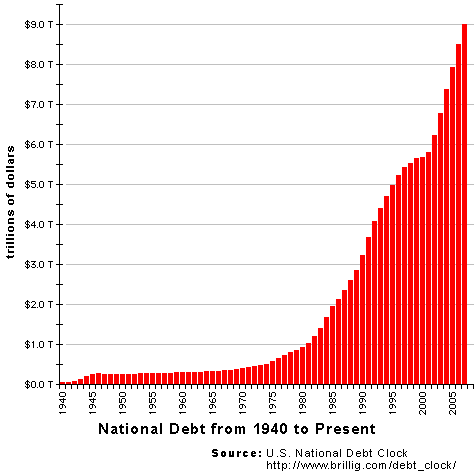The Debt Clock
{category_name}Debt is actually future time. [1]
—Franco “Bifo” Berardi
 Debt crises abound. The government is shutting down. We're running up our debt and running out of time. The Consumer Financial Protection Bureau puts student loan debt at over $1.2 trillion. Debt per taxpayer is currently $148,172. Republicans are threatening to defund the Affordable Care Act. These liabilities are taking over our future. Franco “Bifo” Berardi writes of humanity being sacrificed at the altar of metaphysical debt. This is another way of saying that we’re accumulating debts that can’t be paid. At least not with money. So we’re paying in other ways. We’re paying with our time. We’re paying with our jobs. In Berardi’s terms, we’re sacrificing “[l]ife, intelligence, joy, breathing.” [2] Temporally speaking, debt is something accrued in the past, to be paid down over time. We usually lose sight of these future limitations and think of a loan as pure windfall: an influx of cash for nothing but the abstract possibility of repayment. Berardi asks us in our original consideration to think of debt as future time. When you get a loan, you aren't just getting cash. You are giving up your future.
Debt crises abound. The government is shutting down. We're running up our debt and running out of time. The Consumer Financial Protection Bureau puts student loan debt at over $1.2 trillion. Debt per taxpayer is currently $148,172. Republicans are threatening to defund the Affordable Care Act. These liabilities are taking over our future. Franco “Bifo” Berardi writes of humanity being sacrificed at the altar of metaphysical debt. This is another way of saying that we’re accumulating debts that can’t be paid. At least not with money. So we’re paying in other ways. We’re paying with our time. We’re paying with our jobs. In Berardi’s terms, we’re sacrificing “[l]ife, intelligence, joy, breathing.” [2] Temporally speaking, debt is something accrued in the past, to be paid down over time. We usually lose sight of these future limitations and think of a loan as pure windfall: an influx of cash for nothing but the abstract possibility of repayment. Berardi asks us in our original consideration to think of debt as future time. When you get a loan, you aren't just getting cash. You are giving up your future.
Time and debt: losing one while amassing the other. “No debt will ever be paid.” [3] Baudrillard said this in 1996, referring to the Times Square billboard that tracks two related debt totals. The first is “Our National Debt,” and just below is “Your Family Share.” This family share is an inheritance, handed down from one generation to the next. Although President Clinton balanced the budget, Baudrillard recognized that this debt was nevertheless unpayable. Cash outlay could never settle a debt: “At most, it can be bought over at a bargain price to later be placed back on a debt market (public debt, national debt, global debt) where it will have become a currency of exchange.” [4] These debts aren't going away, just being shifted around interminably. Baudrillard calls them “ex-orbital.” By that he means that they bear no recognizable relation to any worthwhile human activity. They exist in a parallel universe of persistent accumulation, the same as that of information technology. Debt no longer contributes to productive commercial behavior, just as information no longer "contribute[s] to knowledge." [5] All that is left is this perverse scoreboard, this American monument to an unplayable game.

In David Graeber’s Debt: The First 5,000 Years, it is striking the way in which he challenges the traditional story about the history of debt and money. The standard account traces the origin of money to the bartering practices of early economies. As Graeber succinctly describes it, this theory argues that barter societies first developed money, and then evolved credit systems to supplement exchange. Credit, therefore, was a kind of virtual money that came about to simplify and optimize barter transactions. Because of the imperfection of a commercial system based on the double coincidence of wants, money was thought to have facilitated advanced economic transactions.
Graeber reverses this progression. He argues, based on an anthropological review of early societies and some recent discoveries of Mesopotamian credit systems, that debt precedes money. Rather than credit evolving as a kind of virtual money, economic transactions were originally “based on credit.” [6] Money served an administrative function, “created by bureaucrats in order to keep track of resources and move things back and forth between departments.” [7] Money was used in the service of accounting, and did not derive from commercial transactions that were previously based on barter. This means that money was not a necessary and practical advancement. Rather, commercial transactions were originally based on debt. This insight challenges one of the foundations of economics as a science.
The contention that the logic of debt structures or conditions the existence of money is structurally related to Jacques Derrida's work on the relationship between writing and speech. Derrida famously argued that Western philosophy had privileged speech over writing throughout its history:
I would wish rather to suggest that the alleged derivativeness of writing, however real and massive, was possible only on one condition: that the "original," "natural," etc. language had never existed, never been intact and untouched by writing, that it had itself always been a writing. [8]
Describing the hierarchical structure that subordinated writing to speech, Derrida systematically traced the organizing binaries from Plato to Freud, extending through philosophy, history, society. Derrida eventually tied to all instances of secondarity to a cultural preference for all things immediately present. Similarly, the desire for a fully present, face-to-face commercial exchange influenced the centrality of money to economic theory and history.
The tradition Graeber outlines is a familiar one. It is a tradition of the alleged derivativeness of debt. In Derrida's terms, it's not money that conditions debt; rather, the logic of debt conditions the existence of money. Like writing, which merely imitates speech, debt was thought to serve as money's placeholder. Like writing, it is graphic record. Inorganic, it leaves a trace, a paper trail. This kind of thinking can be carried off in all kinds of interesting directions. Think of the prohibition on interest -- usury framed as a perversion of "natural" monetary exchanges.
Where will these comparisons lead us? Perhaps we can continue to take direction from Derrida’s thoughts on writing. He says that "[t]his arche-writing, although its concept is invoked by the themes of 'the arbitrariness of the sign' and of difference, cannot and can never be recognized as the object of a science.” [9] The undecideable characteristics of arche-writing disorganize the prevailing system. Graeber includes a telling proverb about the nature of our economic system in the epigraph to his book, which reads:
If you owe the bank one hundred thousand dollars, the bank owns you. If you owe the bank one hundred million dollars, you own the bank. [10]
What Graeber is getting at is the extent to which this institutional debt is a structural foundation of our economic pursuits. Debt is immanent; there's no way out. Either you own the bank, or the bank owns you. We cannot conceive of the extinguishing of debt. We accept it as a burden, our original sin, our reluctant inheritance. The lines between collective and individual responsibility become blurred. Forced to share in something that isn't ours, we're the guarantors for an institutional debtor.
And yet these binary oppositions persist; in the face of a mounting crisis, conservative Republicans seek a return to the gold standard and a reduction in deficit spending. The Federal Reserve, for its part, has committed to maintaining its $85 billion a month deficit spending habit. We are caught in a paralyzing oscillation, an endless back-and-forth.
What has been forgotten, neglected, or repressed, is that money was created as a unit of administrative measurement. Debt did not grow out of money, but just the opposite. Losing sight of this history, we are ruinously giving up our time, instead of looking for a way out. We should be searching, like Derrida was, for "a concept that can no longer be, and never could be, included in the previous regime." [11] Rethinking insolvency as a right, we might disclaim our inheritance, saying, with Berardi:
We're not going to pay the debt. [12]
Notes
[1] Franco "Bifo" Berardi, The Uprising: On Poetry and Finance (Los Angeles: Semiotext(e)), 84.
[2] Ibid, 25.
[3] Jean Baudrillard, "Global Debt and Parallel Universe," trans. Francois Debris, Liberation, October 16, 1996.
[4] Ibid.
[5] Ibid.
[6] David Graeber, Debt: The First 5,000 Years (Brooklyn: Melville House Publishing), 39.
[7] Ibid.
[8] Jacques Derrida, Of Grammatology, trans. Gayatri Chakravorty Spivak (Baltimore: Johns Hopkins University Press), 56.
[9] Ibid, 57.
[10] Graeber, Debt, 1.
[11] Jacques Derrida, Positions, trans. Alan Bass (Chicago: University of Chicago Press), 42.
[12] Berardi, The Uprising, 57.
Thumbnail image is from here. "Debt" image from the author.


